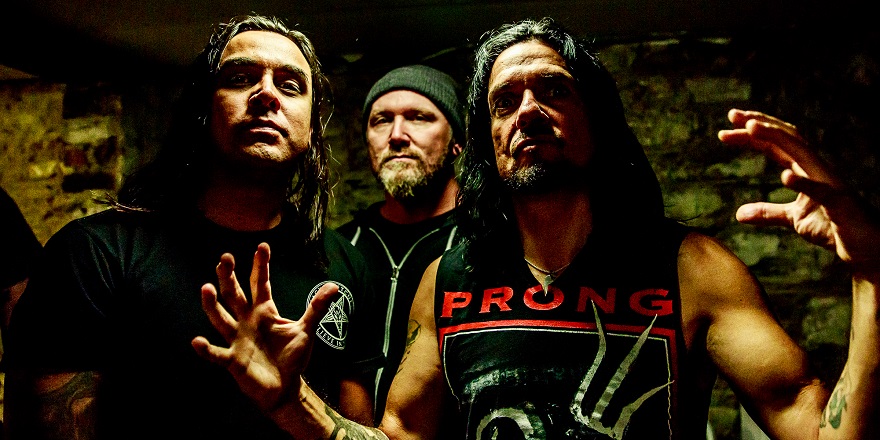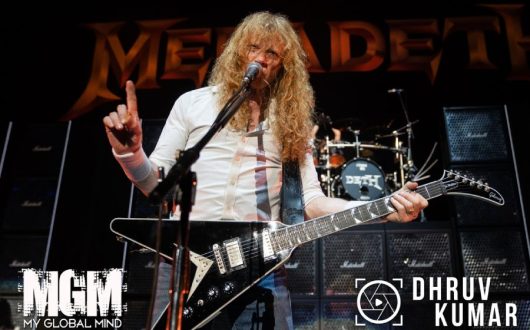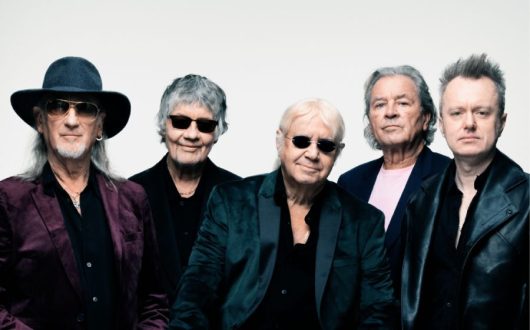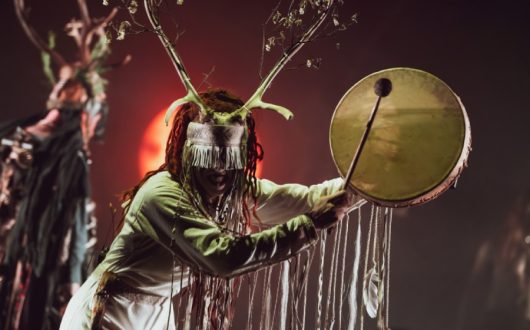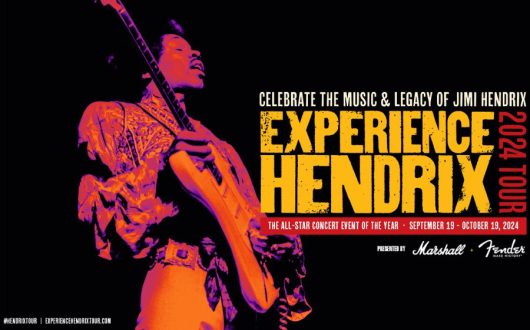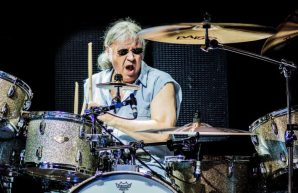Alan: Welcome back to Dublin. It’s been 3 years since you last visit, when you had just released Ruining Lives. Do you have any particular memories of your last time here?
Tommy: We had a really good show here the last time and we’re really excited to come back, if Belfast last night was anything to go by.
Alan: So we missed that last show in Dublin because it was on the same weekend as Bloodstock Festival, where we saw you perform on the mainstage the following day, and it was one of the highlights of the festival for me personally. But you haven’t played at Bloodstock since or before. Why’s that?
Tommy: I don’t know if we were asked back. Some people said we were one of the best bands there. Our booking agent is a real German guy, and we’re so grateful that we’re able to get any UK and Irish dates because sometimes he’s not the greatest at communicating outside of the continent a little bit. So we would like to go back obviously. We want to play as much as we can in this part of Europe.
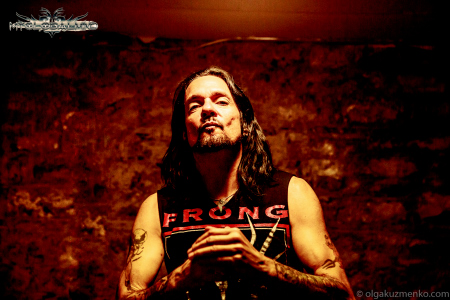
Alan: It’s 30 years since you formed Prong. If there was one moment from the history of Prong that you could relive, what would it be?
Tommy: I think I would have liked to revisit all of the moments from the old days, because I don’t know if I appreciated it that much, or maybe we were too wasted to appreciate it or whatever. Things were weird back then, because we never knew what was going to happen so we were always on edge a lot, and there were so many bands exploding and there was so much going on. And we still are like the underdog band, so there wasn’t anything really there that we felt was any huge achievement back in the day. We always felt pressured by the label. It was always “You guys gotta do better” or “The record should be better”, it was never like we achieved anything. We had some little successes with airplay but no grand event that ever happened.
Alan: That’s surprising, because you kind of stepped away from the norm at the time and did things your own way, and looking back now, that was a brave move.
Tommy: Yeah, it was always brave. We egotistically did those things because we wanted to set ourselves apart, and a lot of it, we had to do too. As far as stylistic changes per record that we made, it was just to break down some barriers with this genre. The bands that do our genre in specific and do what they do well, more power to them. We just felt that our agenda was to do something that was challenging and I think we paid the price for that too. I don’t know if it was economically or business-mindedly smart to do that at all. The bands that are bigger to the masses and seem to just stick to what they do, don’t take too many chances, and then everything’s ok. But with Prong, we were always like “Oh, what are we going to do now to mess this thing up”, and we did it, but when you look back and the people that do know the band, and the records, they think that was pretty bold. That’s just something that’s ingrained in me, because we continue to do that on the recent records too.
Alan: It almost sounds like you regret not selling out.
Tommy: I know it does sound like that. Look, it would be nice to have some blanket of security here, but I guess there’s something deep inside of me that disables me from doing that. I think we were fearful too of bands that came and went. When Mike Kirkland and I started the band, he was like “I want longevity. I want to keep doing this.” and we made some decisions that kept it long-standing. Unfortunately, Mike couldn’t do some of the mundane things like get in a van and trudge the road of happy destiny out on the road that much. And when the A&R guy at the record label that signed you was four A&R guys before you. Things started getting crazy up at Epic records, and there were so many rapid changes in the music business. We just tried to survive, and survival is something to give credit to as well.
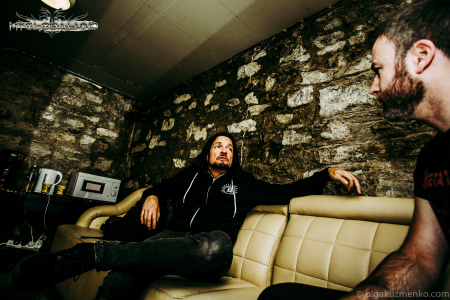
Alan: Do you think it’s more difficult to survive now than it was thirty years ago?
Tommy: I think there are so many bands. The ease of making records attributes to that. When you go on Spotify, I’m alarmed at how many releases there are. There’s an incredible amount of stuff coming out. So yeah, it is difficult to survive these days and to hold your own.
Alan: You mention the high number of releases. Even Prong has released 5 studio albums in the past 5 years.
Tommy: Well, I meant by different types of bands. Like different artists. But yeah we’ve been putting out a lot of releases.
Alan: Is that something you feel pressured to do, or do you have an urge to keep writing and recording?
Tommy: It was part of a strategy, but if I didn’t feel like we could do it, I wouldn’t do it. Sometimes there’s a period when I don’t know if I can go in and write another record, but sometimes you will it to happen. When you set your mind to it, you can make it happen. And it’s a lot of work, but I’m sort of a veteran, so there’s certain decisions that take less than people starting out. Not wasting time on certain issues helps a lot in order to make it happen. But part of the strategy would be that since there was such periods of inactivity between records, working on other projects, or I got lazy, or whatever, we got to make amends for that and put out consistently good releases to get back on the playing field. That was important. Otherwise the whole thing would have just dissolved if we didn’t keep plugging away at these records. So we agreed communally that it was a good thing to do.
Alan: So tell us a little bit about Zero Days, which is just over a week away from release. What were your inspirations and influences?
Tommy: It’s funny, because, when it was proposed, No Absolutes had just come out, and people were saying “You’ve gotta start thinking about making another record already”, and I’m like “Woah, woah, woah, this is crazy!”, because we were touring a lot and I thought about it for a week, and I just got on the guitar and thought “This could be done”. So I just started documenting everything that I would come up with, and put it on the computer, and was continually doing that. And based on the fact that we did Ruining Lives and No Absolutes so fast, I felt pretty confident with [Chris] Collier (co-producer/engineer) and the band and everybody involved that we were able to do this. Initially I was a little afraid, but when I started getting in and seeing that there were some ideas floating around and that there were a lot of guys willing to contribute and to help out on this, we got it done. And as I got in there, I got more energised, and wanted to keep going. When I got into that work mode, I couldn’t stop. Especially with the lyrics, making sure those were fine-tuned, and the vocal melodies were really important, and have been important on these recent releases for me. Getting in a room and sitting there plugging in lyrics and vocals over these riffs that were coming up and then jamming it out and going through the stages to finalise it. And it came down to the last wire. We were ready to go on an American tour with Testament and Sepultura, and the record really got finished three days before we went out on the tour. That wasn’t scheduled. I was pushing Chris Collier on certain issues to get these things done, and I was watching the clock a lot, and we just pulled it together. It was another miracle in a way. But miracle happens from the will and having a deadline is sometimes a good thing. Because otherwise, musicians tend to get flaky on certain things. So we had these strict disciplined agendas daily on what we were going to do and get it done, then if there are mistakes that happen along the line, then you have some time and headroom to make up lost time.
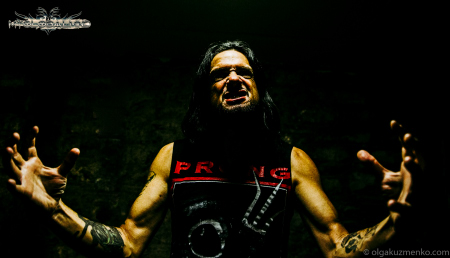
Alan: And for No Absolutes, I read that a lot of the guitar solos were improvised during the recording…
Tommy: They were quickly done. In general, I’ve gotten into that mode a little bit. I don’t like to spend a huge amount of time on it. Even on this record (Zero Days), we reached a point where we thought “we’re going to have to start thinking about guitar solos now”. Then I would go home and bust out a couple of things. And then we have some guest guys too, like Marzi Montazeri on one song. Sometimes having these guest guys takes up more time than anything. Like they would send stuff over, and it’d be like “Wow, this is not going to work” and we already committed to these guys, so trying to chop up what they did and fit it in was almost more time consuming than me doing the whole thing. So we had Chris Canella, Greg Harrison and Marzi Montazeri as guest duel co-solos. So that helps out too. Getting that done is another little slice in the jigsaw puzzle. For No Absolutes, the sense of urgency wasn’t as much as on Zero Days. This one, the whole process was a lot more intense, and I was pushing a little harder, especially on vocals and lyrics.
Alan: So regarding lineup changes, the last time you were here, Jason Christopher was still in the band. He has since move to Ministry, a band you served time in also. I think he was in Prong for 3 studio albums which might be a record for a Prong bassist?
Tommy: I don’t think he did anything on Ruining Lives. He helped write a part of one song, but he wound up not doing the bass on that one. But Songs from the Black Hole and No Absolutes, yeah.
Alan: What happened with Jason?
Tommy: This thing was too small time for him or something. He had pressures at home and had a newborn kid, and this thing’s a rough grunge project, and it takes a certain stamina. Guys like Art; he’s been around with Winds of Plague for years. Jason didn’t have that experience. He fell into doing Stone Sour, and he left that after only six months. He caters to a more luxurious experience than working with Prong, you know? We’ll see what happens with anything else he gets involved in. He was good to have around at certain times, but he was getting moody about being with Prong and the way things were going was just not on this huge scale that he tends to think he’s deserving of.
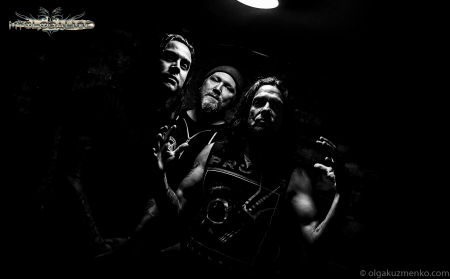
Alan: Well, we’re looking forward to seeing Mike [Longworth] for the first time here. Speaking about other bands… You’re also still a member of Danzig. How do you juggle both?
Tommy: It’s very difficult. Glenn hasn’t been doing a lot of shows recently. He really doesn’t want to find another guitar player, so he’s been working around my schedule.
Alan: Danzig also have a new album in recent months. Were you involved in the recording of that?
Tommy: Playing on a Danzig record is a whole other thing. It’s hectic, but I’ve done it so many times now that I know what to expect, so I know what to expect.
Alan: Speaking of Glenn, there was an incident in Canada where an Irish fan was allegedly assaulted by Glenn for taking photos of him from the audience. Do you remember what happened exactly?
Tommy: There’s so many of those incidents with him that I’ve gotten numb to all that part of playing with Glenn. That’s his bag. That whole agenda and the way he feels about certain things, I have nothing to do with it. I go there, I play guitar, I jump around on stage, I try not to step on anybody’s toes, and I just do my job, and that’s the jist of it. I try my hardest not to get involved in those situations, to pay any attention to it. It’s not my trainwreck. I don’t get involved in that shit. I don’t really even know what happened. I just heard that there was chaos. Every time I turn around there’s another incident like that and I just try to maintain my focus. I’m there to play guitar, and that’s it.
Alan: Other big frontmen have done similar, like Corey Taylor and David Draiman, by calling out people recording their shows. What’s your own take on people taking photos or videos during shows?
Tommy: Yeah, the guys with all the big money. They’re the ones complaining about it. I don’t know. Maybe when you’re at that stage you have a different attitude about it. If you come to a Prong show, you see people filming me, right there. I’m almost flattered if people are taking pictures or filming it. You’re paying money to get in there, you’ve got a cellphone, I really don’t care that much. I don’t think there’s a huge gangload of money to be made from DVD sales anymore.
Alan: Where I can see it causing problems is where a band performs a brand new song before it has been officially released, and then a crappy quality YouTube clip of the song surfaces, and fans hear that before the studio quality recording as you would want to present it, and that dilutes the quality of new music.
Tommy: We can’t police these things. It’s just a waste of time. If I’m going to be fearful of having a bad performance on a certain song and somebody films it, then that’s my fault.
Alan: Well, it’s not that the performance is bad, but that the recording quality is bad. Like brick-walled volume levels.
Tommy: People will eventually hear the record, and we’ve already released a lyric video for ‘Divide & Conquer’ which we’ve been performing from Zero Days.
Alan: On that topic, will you play any other new songs before the release date?
Tommy: We’ll be playing ‘Forced into Tolerance’ after the release date, but we’ve got to rehearse it more.
Alan: There’s going to be a bonus track on Zero Days – ‘Reasons to be Fearful’. Why do bands still release bonus tracks?
Tommy: Fucked if I know! It’s something to do with Japan and the different formats. Like it doesn’t fit on the vinyl, so it’s on the CD. It’s just something that’s been done. We had two other songs that were done that weren’t on the record. I was even curious to see where they would go with the bonus track. I didn’t feel that that song really fit on the complete album, although it’s a killer track. I didn’t want it on the regular release anyhow.
Alan: And you say there’s another track that might turn up elsewhere?
Tommy: If we finish mixing it, yes. There’s a couple of things that have to be done to it.
Alan: After three decades of Prong, where would you like to see yourself in another 10 years?
Tommy: I don’t know. I’m not a guy with a crystal ball. I try my best not to project that much. That’s a battle for anybody in this business. Sometimes too much planning interferes with things. It’s all up to the art gods in a way. That’s from doing it so long and having these grandiose ideas and then they all explode because of something that comes from a different direction. You have to adapt.
Alan: If you could give your 20 year old self a piece of advice before starting out, what would you tell him?
Tommy: As far as getting involved in the music business? I would dissuade them from it. This is the thing… Everybody goes in front of the mirror when they’re a kid, and they’re paying air guitar, and thinking “I want to get in a band”. That’s how it started with me. And you feel like you can get all this glory and all this stuff that will boost your ego or give yourself a false vision of your own self. But this business beats you into humility. If you want to be taken away from that, this is a good project to get into. If you’re trying to push your ego, you’re going to end up like Michael Jackson, and wind up destroying yourself. Like Pete Steel or Chris Cornell. You take yourself too seriously after a while, and that’s a dangerous road. That’s bad news.
Alan: Any last messages for your Irish fans?
Tommy: Go on Facebook and like us! I’m trying to build that. If you have any questions, I’m pretty active on there. Unless there’s any weird psycho shit, but I try to answer questions here and there, especially about equipment etc.
